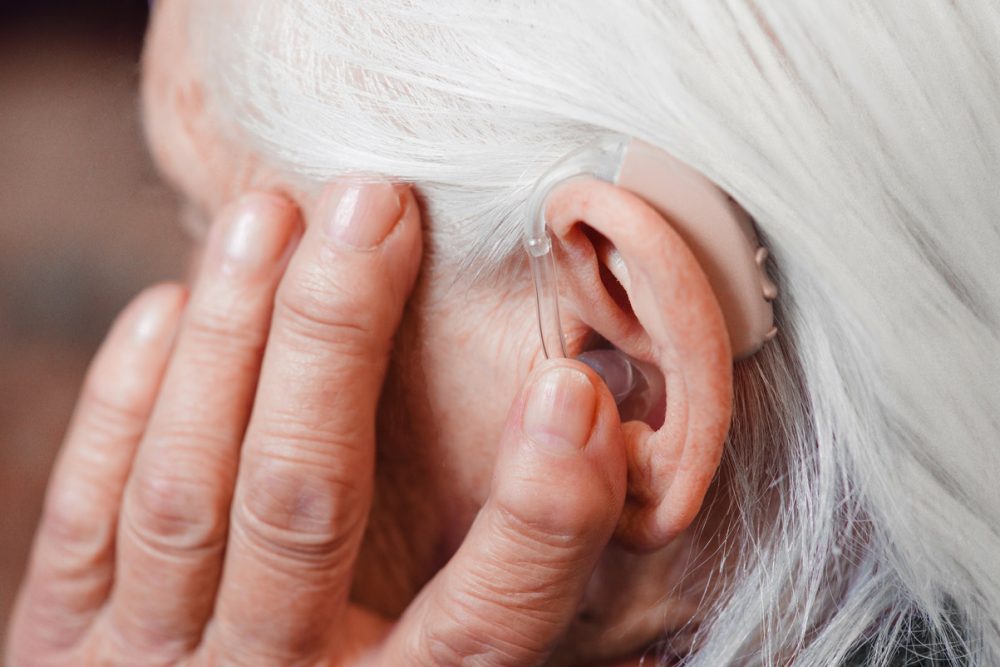Advertisment
Hearing aids reduce risk of dementia

People with hearing loss who do not use hearing aids appear to be at a higher risk of developing dementia than people with hearing loss who use hearing aids, researchers reported on April 13, 2023 in The Lancet Public Health.
“The evidence is building that hearing loss may be the most impactful modifiable risk factor for dementia in mid-life, but the effectiveness of hearing aid use on reducing the risk of dementia in the real world has remained unclear. Our study provides the best evidence to date to suggest that hearing aids could be a minimally invasive, cost-effective treatment to mitigate the potential impact of hearing loss on dementia,” said author Professor Dongshan Zhu of Shandong University in Jian, China.
The investigators retrospectively analyzed data from the UK Biobank, a population-based cohort study, which recruited adults aged 40–69 years between 2006 and 2010 across 22 centers in England, Scotland, and Wales. For this new analysis, the researchers used data from 437,704 subjects.
The average age of subjects at registration was 56 years-old, and the average follow-up was 12 years.
The researchers used standard statistical tools to estimate the correlation between self-reported hearing aid use status (hearing loss with or without hearing aids) at baseline and ensuing risk of dementia (all-cause dementia, Alzheimer’s disease, vascular dementia, and non-Alzheimer’s disease non-vascular dementia).
Hearing loss information and data on hearing aid use was extracted from self-reported questionnaires.
The researchers obtained dementia diagnoses from hospital records and death-register data.
The investigators reported that about three-quarters of the subjects (325,882/437,704) had no hearing loss. The remaining one-quarter (111,822) had some level of hearing loss.
Among those with hearing loss, 11.7% (13,092 / 111,822) used hearing aids.
After adjusting for other factors, the researchers reported a 1.7% risk of dementia for subjects with hearing loss who did not use hearing aids, compared to 1.2% for subjects either without hearing loss or with hearing loss who used hearing aids.
“Close to four-fifths of people experiencing hearing loss do not use hearing aids in the UK. Hearing loss may begin early in one’s 40s, and there is evidence that gradual cognitive decline before a dementia diagnosis can last 20 to 25 years. Our findings highlight the urgent need for the early introduction of hearing aids when someone starts to experience hearing impairment. A group effort from across society is necessary, including raising awareness of hearing loss and the potential links with dementia, increasing accessibility to hearing aids by reducing cost, and more support for primary care workers to screen for hearing impairment, raise awareness, and deliver treatment such as fitting hearing aids,” said Professor Zhu.
Writing in a Linked Comment, Professor Gill Livingston and Dr. Sergi Costafreda, University College London, who were not involved in this research, said: “With the addition of Jiang and colleagues’ work, the evidence that hearing aids are a powerful tool to reduce the risk of dementia in people with hearing loss, is as good as possible without randomised controlled trials, which might not be practically possible or ethical because people with hearing loss should not be stopped from using effective treatments. Dementia is not only an illness that affects the individual and their family but can also be expensive. However, using hearing aids to prevent dementia has been found to be cost-effective and cost-saving. In the USA, hearing aids have become available to purchase over the counter, thus making them more accessible. The evidence is compelling that treating hearing loss is a promising way of reducing dementia risk. This is the time to increase awareness of and detection of hearing loss, as well as the acceptability and usability of hearing aids.”





